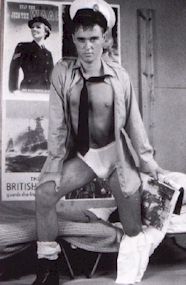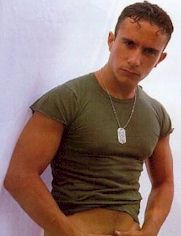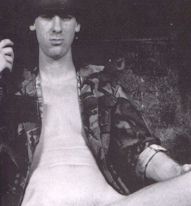 |

 |
|
Jesse Monteagudo's Book Nook
By Steven Zeeland Military Trade by Steven Zeeland; Harrington Park Press; 265 pages; $19.95
 Steven Zeeland has carved a niche for himself with his books about
male homo-sexual behavior in the U.S. military. This self-styled "lover of
soldiers" has covered the field in Barrack Buddies and Soldier Lovers
(1993), Sailors and Sexual Identity (1995) and The Masculine Marine (1996).
Steven Zeeland has carved a niche for himself with his books about
male homo-sexual behavior in the U.S. military. This self-styled "lover of
soldiers" has covered the field in Barrack Buddies and Soldier Lovers
(1993), Sailors and Sexual Identity (1995) and The Masculine Marine (1996).
In Military Trade, Zeeland chronicles the lives of "military chasers" men (and a woman) who have a passion for servicemen. Zeeland, himself a "chaser", knows what he's writing about. As we all know, the idea of dividing humanity into tidy categories of "homosexual", "heterosexual" and "bisexual" is a recent concept. Well into this century, and still today in many societies, straight-identified men could and did have sex with other men without being stigmatized.
Gay or not, servicemen represent masculinity to those who seek it; as one of Zeeland's subjects says, "In most cases, you're guaranteed that if the guy's a soldier, he's gonna be a real man." "Among the reasons that immediately come to mind are a certified masculinity; the association of masculinity with potency, with aggression, with being on top, with large genitalia, with buckets of semen", says another, more scholarly, "chaser". Zeeland himself is attracted to men who exhibit "an unstudied masculinity" - as opposed to the gay gym boys who have to work at it ("Cory" calls it "ersatz masculinity"). There is a lot of sexism and misogyny in this, as even Zeeland admits, and even, in some cases, a bit of self-hatred. But Zeeland is quick to deny that military chasers are driven by "internalized homophobia": "It is a peculiarly late-twentieth century idea to insist that men who like men must not be attracted to men generally, but must restrict themselves to a tiny population that embraces a stigma-driven sexual minority identity."
 I should point out that chasers are not driven by a
fetish for uniforms: "To most military chasers, uniforms are valued not as
arousing in themselves, but as a mark of authenticity."
I should point out that chasers are not driven by a
fetish for uniforms: "To most military chasers, uniforms are valued not as
arousing in themselves, but as a mark of authenticity."
Though all servicemen are fair game to military chasers, some are more desirable than others. In Military Trade, Zeeland and his subjects rank the branches in order of desirability: According to "Cory", Marines are # 1, because of their "hypermasculinity", of course, and in spite of the Marines' notorious reputation for throwing up their legs the moment they hit the bed (see The Masculine Marine). Sailors ("gay icons") come in second; airmen and Coast Guard men follow; and soldiers bring up the rear, if only because "the Army [will] take anybody." Most military trade are "gay for pay". "I'll leave my phone number with some phrase like 'BJ for USMC' ... [or] 'Good $$$ for BJ for USMC'," notes "Cory". Writer "Rolf Hardesty" recalls making good money pimping Marines to Hollywood stars during the sixties and seventies. Another subject, "Don", makes "authentic" military porn videos, a lucrative line to be sure and one that is never without willing participants. The men (and one woman) who lay their lives on the line in Military Trade have nothing in common but their taste for military men. Some of them just want to have a good time while others want a long-term relationship, which is almost impossible under these circumstances.
 "Years of recreational sex with sailors taught me many things about them, about me,
and about life. Including this valuable life lesson: "No matter how much
you like a guy, and no matter how many times he lets you suck his dick,
don't get emotionally involved. He'll only make you cry," says "Maynard",
who spent his adult life"servicing sailors".
"Years of recreational sex with sailors taught me many things about them, about me,
and about life. Including this valuable life lesson: "No matter how much
you like a guy, and no matter how many times he lets you suck his dick,
don't get emotionally involved. He'll only make you cry," says "Maynard",
who spent his adult life"servicing sailors".
Still, in spite of this, "Maynard" has no regrets: "I felt no immorality when I gave those young men sexual relief and temporary companionship. There was (usually) no guilt on my part. I hope the same was true for them. Lonely servicemen have needed guys like me since the first troops gathered into regiments and marched or sailed away from home." Military Trade makes a good case for military chasers. Whether in first-person accounts, or interviews by Zeeland, their stories make fascinating, even stimulating reading. Though I do not share their tastes, I can appreciate their passion for "men in uniform"; and only regret that today's rigid divisions prevent many men (in or out of uniform) from having sex with other men. My only complaint is that, after Military Trade, Zeeland might have run out of topics! We can only trust that this talented "lover of soldiers" will find something else to write about.  Awards (Continued): Double Winner 'The Other Side of Silence'
Awards (Continued): Double Winner 'The Other Side of Silence'
In a recent column I listed the winners of this year's Lambda Literary Awards. Not surprisingly, I left out one very important prize. This was the winner in the Gay Men's Studies category, which was The Other Side of Silence: Men's Lives and Gay Identities: A Twentieth-Century History by John Loughery (Holt). Loughery's masterful history of gay life in the 20th Century also won the Publishing Triangle's Randy Shilts Award for Non-Fiction and, if I may say so, was "The Book Nook's" 1998 Book of the Year. Photos: Badpuppy's UK Uniform Guys |
 © 1997-99 BEI
© 1997-99 BEI